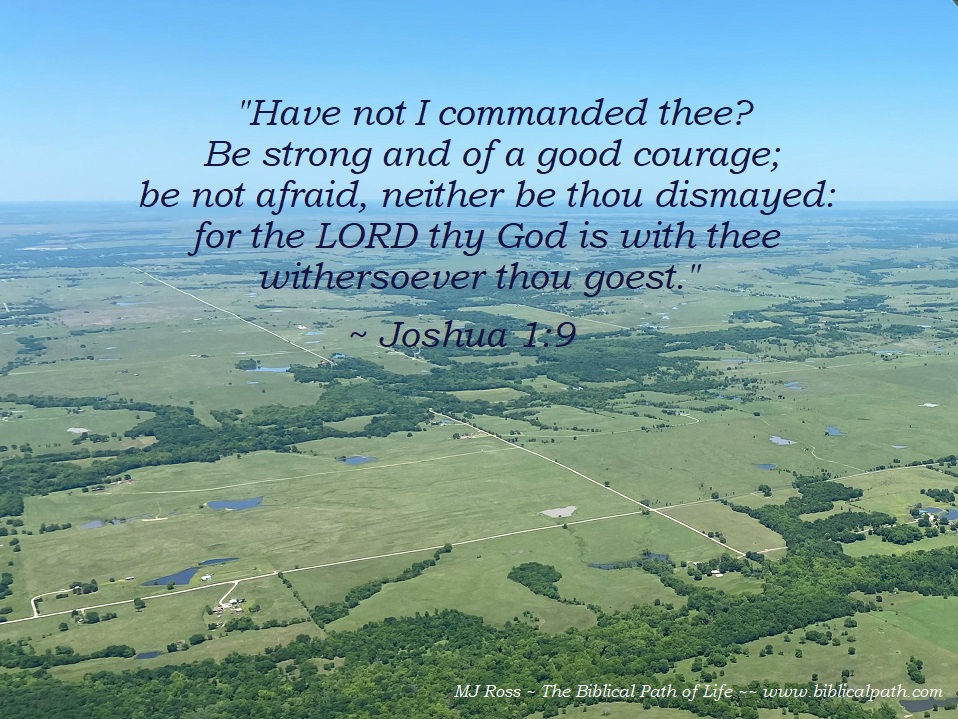
“Have not I commanded thee? Be strong and of a good courage; be not afraid, neither be thou dismayed: for the LORD thy God is with thee whithersoever thou goest.”
Joshua 1:9
Joshua was born a slave in Egypt. He saw the mighty works of God revealed in the ten plagues, providing the exit of the Israelite people out of bondage. Joshua saw the parting of the Red Sea for God’s people, and the destruction of the Egyptian army. About two months later, Moses called upon Joshua to lead an army against the Amalekites. In this battle, as long as Moses’ arms were held high in the air, Joshua was able to lead the people in winning that battle until the enemy was defeated (see Exodus 17:8-16). “And the LORD said unto Moses, Write this for a memorial in a book, and rehearse it in the ears of Joshua: for I will utterly put out the remembrance of Amalek from under heaven” (Exodus 17:14). God wanted Moses to write this victory down and remind Joshua. Have you considered that this was done so that Joshua would remember this as he prepared for the battles in the Promised Land?
Joshua was called Moses’ minister (a servant). “And Moses rose up, and his minister Joshua: and Moses went up into the mount of God” (Exodus 24:13). This is the time-frame when God gave Moses the “tables of stone, and a law, and commandments which I have written” (see Exodus 24:12). Joshua was with Moses when Moses came down from the mount and saw the golden calf (see Exodus 32:17).
While the Israelites traveled through the wilderness, Moses set up a special tent where he met with God (before the Tabernacle was built. See Exodus 33:7-11). Joshua stayed in that tent. “And the LORD spake unto Moses face to face, as a man speaketh unto his friend. And he turned again into the camp: but his servant Joshua, the son of Nun, a young man, departed not out of the tabernacle” (Exodus 33:11).
Most people remember that Joshua was one of the twelve spies sent to spy out the Promised Land. Only he and Caleb believed God (see Numbers 15). Joshua was not afraid to stand up with Moses and Caleb against the 10 spies, the majority. Joshua and Caleb revealed that they believed God was greater than the difficulties ahead, and God would defeat the enemies for them. However, because the people listened to the ten spies, God declared they would wander in that wilderness for forty years until that generation died. All died in the wilderness except for Joshua and Caleb, two who believed God. Even with the delay of 40 years to enter the Promised Land, Joshua stayed with Moses. For those 40 years in the wilderness, Joshua and Caleb watched as the older generation died off, but each day brought them closer to the Promised Land.
Looking back upon Joshua’s life, notice something. Throughout the wanderings, God was preparing Joshua to be the successor to Moses. Remember the defeat of Og, king of Bashan where Moses encouraged Joshua to not be afraid of his enemies (see Deuteronomy 3:21-28 and Numbers 21:33-35). “21. And I commanded Joshua at that time, saying, Thine eyes have seen all that the LORD your God hath done unto these two kings: so shall the LORD do unto all the kingdoms whither thou passest. 22. Ye shall not fear them: for the LORD your God he shall fight for you” (Deuteronomy 3:21-22).
Before Moses died, he revealed God had chosen Joshua to lead the Israelites into the Promised Land (the land of Cannan). “7. And Moses called unto Joshua, and said unto him in the sight of all Israel, Be strong and of a good courage: for thou must go with this people unto the land which the LORD hath sworn unto their fathers to give them; and thou shalt cause them to inherit it. 8. And the LORD, he it is that doth go before thee; he will be with thee, he will not fail thee, neither forsake thee: fear not, neither be dismayed” (Deuteronomy 31:7-8). God would be with Joshua.
When Moses died and Joshua became the leader of God’s people, God encouraged Joshua. “Have not I commanded thee? Be strong and of a good courage; be not afraid, neither be thou dismayed: for the LORD thy God is with thee whithersoever thou goest” (Joshua 1:9).
Looking back at Joshua’s life, God had been preparing him for many years for the task at hand.
First, Joshua had to obey God. We read no hesitation on his part. Even more encouraging is that he completed what God asked him to do. “As the LORD commanded Moses his servant, so did Moses command Joshua, and so did Joshua; he left nothing undone of all that the LORD commanded Moses” (Joshua 11:15). See also: “So Joshua took the whole land, according to all that the LORD said unto Moses; and Joshua gave it for an inheritance unto Israel according to their divisions by their tribes. And the land rested from war” (Joshua 11:23).
Remember how Joshua felt at the end of his life. “14. Now therefore fear the LORD, and serve him in sincerity and in truth: and put away the gods which your fathers served on the other side of the flood, and in Egypt; and serve ye the LORD. 15. And if it seem evil unto you to serve the LORD, choose you this day whom ye will serve; whether the gods which your fathers served that were on the other side of the flood, or the gods of the Amorites, in whose land ye dwell: but as for me and my house, we will serve the LORD” (Joshua 24:14-15).
Have you considered the things God has placed in your live to prepare you for what He has planned for you?
